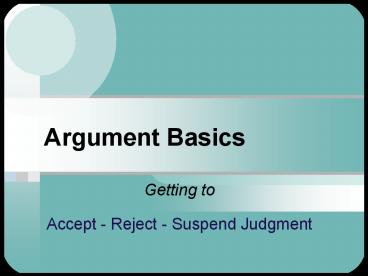Argument Basics - PowerPoint PPT Presentation
1 / 24
Title:
Argument Basics
Description:
Madonna's productions frequently contain religious themes and symbolism. ... So, Madonna's work, even her highly sexual material, must be protected as ... – PowerPoint PPT presentation
Number of Views:53
Avg rating:3.0/5.0
Title: Argument Basics
1
Argument Basics
- Getting to
- Accept - Reject - Suspend Judgment
2
Argument Basics
Premises 1) Acceptable 2) Relevant
Conclusion
3
Argument Basics
Premises The polls show overwhelming disapproval
of the president. Unpopular presidents rarely are
successful in major proposals.
Conclusion This president's radical ideas will
not be enacted into law.
4
About Premises
- May be stated or unstated
If the noise level is too high, someone will
call the police. The party is getting awful
loud. So, someone's going to call the police.
5
About Premises
- May be stated or unstated
- May be dependent or independent
Dependent premises need at least one other
premise to provide logical support for a
conclusion. Independent premises provide some
support for an arguments conclusion whether or
not any other premises are present (given
reasonable assumptions).
6
About Premises
- May be stated or unstated
- May be dependent or independent
Non-consumable energy sources are generally less
polluting than consumable energy sources. Solar
energy is a non-consumable energy source. Coal is
a consumable energy source. So, solar energy is
probably less polluting than coal.
7
About Premises
- May be stated or unstated
- May be dependent or independent
In every free society, there must be opposite
parties and violent dissensions. A free society
cannot be preserved if the parties do not commit
to remaining united. So, a free America can be
expected to include both strong dissent and
commitment to preserve the union.
8
About Premises
- May be stated or unstated
- May be dependent or independent
- May be indicated by lead-in words or phrases
Since For the reason that For In view
of Because This is implied by
9
About Premises
- May be stated or unstated
- May be dependent or independent
- May be indicated by lead-in words or phrases
- May need support or explanation
This is usually provided in a supporting or
explanatory paragraph or in more detailed
discussion.
10
About Premises
- May be stated or unstated
- May be dependent or independent
- May be indicated by lead-in words or phrases
- May need support or explanation
- May be surrounded by irrelevancies
11
About Conclusions
- May be stated or unstated
Religious freedom is the first freedom guaranteed
in the Bill of Rights. It was also the single
most important reason why the earliest settlers
in the Colonies left the safety and relative
comfort of their homes to start new lives
here. The bedrock freedoms of American
civilization will always need to be protected and
interpreted for the times. So
12
About Conclusions
- May be stated or unstated
Religious freedom is the first freedom guaranteed
in the Bill of Rights. It was also the single
most important reason why the earliest settlers
in the Colonies left the safety and relative
comfort of their homes to start new lives
here. The bedrock freedoms of American
civilization will always need to be protected and
interpreted for the times. So, we must still
interpret and defend religious freedom.
13
About Conclusions
- May be stated or unstated
- May be controversial
Madonnas productions frequently contain
religious themes and symbolism. Her work has been
the topic of serious study by respected scholars
of religion. So, Madonnas work, even her highly
sexual material, must be protected as religious
expression by the First Amendment.
14
About Conclusions
- May be stated or unstated
- May be controversial
- May be indicated by lead-in words or phrases
Thus Therefore This shows
that So Accordingly... This implies
that Hence Consequently This proves
that Ergo It follows that This suggests that
15
About Conclusions
- May be stated or unstated
- May be controversial
- May be indicated by lead-in words or phrases
- Must contain only terms found in the premises (or
their equivalents)
16
About Conclusions
- May be stated or unstated
- May be controversial
- May be indicated by lead-in words or phrases
- Must contain only terms found in the premises (or
their equivalents)
The presence of new terms in a conclusion is
strong evidence of assumptions used as unstated
premises.
17
Arguments and Explanations
Arguments and explanations are often confused
with each other.
18
Arguments and Explanations
- Premises
Conclusion
19
Arguments and Explanations
- How
- or
- Why
Phenomenon to be Explained
20
Arguments and Explanations
- Premises
- How
- or
- Why
Conclusion
Phenomenon to be Explained
21
Deductive and Inductive Arguments
One way of conceptualizing arguments divides them
into two major classes deductive and inductive.
22
Deductive and Inductive Arguments
One way of conceptualizing the main difference
between deductive and inductive arguments is by
the degree of confidence one is supposed to have
in the conclusion if the premises are accepted.
23
Deductive and Inductive Arguments
- Deductive arguments are constructed with the
intention of supporting their conclusions
perfectly, that is, with premises that, if true,
prove or guarantee the truth of the conclusion.
24
Deductive and Inductive Arguments
- Deductive arguments are constructed with the
intention of supporting their conclusions
perfectly, that is, with premises that, if true,
prove or guarantee the truth of the conclusion.
- Inductive arguments are constructed with the
intention of providing the strongest possible
support for the conclusion, even though they are
unable to guarantee the truth of the conclusion.































